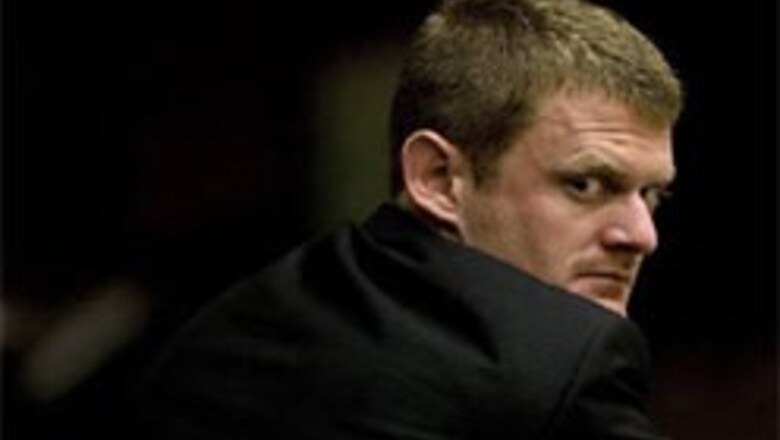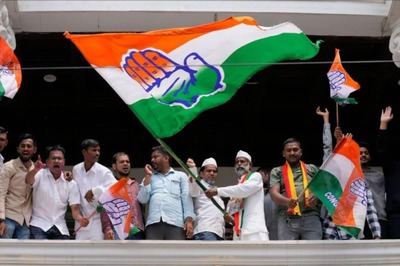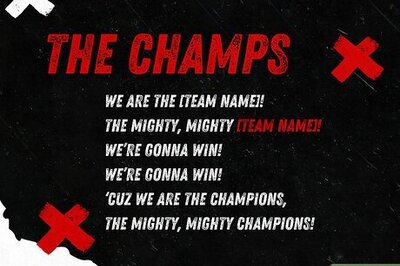
views
Paris: The verdict said "guilty."
Like so much else in the confusing, contentious Floyd Landis doping case, though, none of the answers are really that simple.
Landis lost his expensive and explosive case Thursday when two of three arbitrators upheld the results of a test that showed the 2006 Tour de France champion used synthetic testosterone to fuel his spectacular comeback victory.
The decision means Landis, who repeatedly has denied using performance-enhancing drugs, must forfeit his Tour title and is subject to a two-year ban, retroactive to January 30, 2007.
Not that it changes his opinion of who the rightful winner was.
"I am innocent," he said, "and we proved I am innocent."
The majority of the panel disagreed.
According to documents obtained by The Associated Press, lead arbitrator Patrice Brunet and Richard McLaren voted to uphold the positive test with Christopher Campbell dissenting.
In its 84-page decision, the majority found the initial screening test to measure Landis' testosterone levels—the testosterone-to-epitestosterone test—was not done according to World Anti-Doping Agency rules.
But the more precise and expensive carbon-isotope ratio analysis (IRMS), performed after a positive T-E test is recorded, was accurate, the arbitrators said, meaning "an anti-doping rule violation is established."
"As has been held in several cases, even where the T-E ratio has been held to be unreliable. The IRMS analysis may still be applied," the majority wrote. "It has also been held that the IRMS analysis may stand alone as the basis" of a positive test.
"Today's ruling is a victory for all clean athletes and everyone who values fair and honest competition," US Anti-Doping Agency CEO Travis Tygart said.
Now, Landis is left with one final way to possibly salvage his title—an appeal to the Court of Arbitration for Sport.
If Landis doesn't appeal—or appeals and loses—he'll be the first person in the 105-year history of the race to lose the title because of a doping offense.
PAGE_BREAK
Given the vigor with which he pursued the case, and the more than $2 million he raised to do it, this goes down as a devastating loss for the 31-year-old cyclist from Murietta, California.
He has steadfastly insisted that cheating goes against everything he stands for. He said he was merely a pawn in the anti-doping system's all-consuming effort to find cheaters and keep money flowing to its labs and agencies.
"This ruling is a blow to athletes and cyclists everywhere," Landis said. "For the Panel to find in favor of USADA when, with respect to so many issues, USADA did not manage to prove even the most basic parts of their case shows that this system is fundamentally flawed."
"I have to assess whether a system that corrupt is worth subjecting myself to again," Landis told ESPN.com. "I don't have any reason to believe that CAS is any more sincere.
"Money is a large part of it. I have to consider my family when I consider risking everything I have left. It might be like putting all my money in a slot machine.
"The only way this could have come out any differently is if one of the arbitrators was drunk and checked the wrong box," he said. "There's something going on here other than trying to figure out the science."
"This is a miscarriage of justice," said Maurice Suh, the lead attorney for Landis.
"He is at the mercy of people much bigger than him," said Landis' mother, Arlene, speaking to WGAL-TV in Lancaster, Pa.
The decision comes more than a year after Landis' stunning comeback in Stage 17 of the 2006 Tour, one that many people said couldn't be done without some kind of outside help.
Pat McQuaid, leader of cycling's ruling body, said rules dictate that Landis can be stripped of his Tour de France title immediately. That makes Oscar Pereiro, who finished second last year, the official winner.
"It's not a great surprise considering how events have evolved," McQuaid said. "He got a highly qualified legal team who tried to baffle everybody with science and public relations. And in the end, the facts stood up."
Landis insisted on a public hearing not only to prove his innocence, but to provide an unflinching look at USADA and the rules it enforces, and also establish a pattern of incompetence at the French lab where his urine was tested.
PAGE_BREAK
Although the panel rejected Landis' argument of a "conspiracy" at the Chatenay-Malabry lab, it did find areas of concern. They dealt with chain of command in controlling the urine sample, the way the tests were run on the machine, the way the machine was prepared and the "forensic corrections" done on the lab paperwork.
"The Panel finds that the practises of the Lab in training its employees appears to lack the vigor the Panel would expect in the circumstances given the enormous consequences to athletes" of an adverse analytical finding, the decision said.
The majority repeatedly wrote that any mistakes made at the lab were not enough to dismiss the positive test, but also sent a warning.
"If such practises continue, it may well be that in the future, an error like this could result in the dismissal" of a positive finding by the lab.
In Campbell's opinion, the Landis case should have been dismissed.
"The documents supplied by (the French lab) are so filled with errors that they do not support an Adverse Analytical Finding," Campbell wrote. "Mr. Landis should be found innocent."
In at least one respect, Landis was innocent, because the panel dismissed the T-E test. But in the arbitration process, a procedural flaw in the first test doesn't negate a positive result in follow-up tests.
In his dissent, Campbell latched onto the T-E ratio test, among other things, as proof that the French lab couldn't be trusted.
"Also, the T-E ratio test is acknowledged as a simple test to run. The IRMS test is universally acknowledged as a very complicated test to run, requiring much skill. If the LNDD couldn't get the T-E ratio test right, how can a person have any confidence that LNDD got the much more complicated IRMS test correct?"
It was confusion like this that resulted in the harsh review the anti-doping movement received during Landis' nine-day hearing in May.
But Landis also took his share of abuse, and ultimately, USADA still improved to 35-0 in cases it has brought before arbitration panels since it was founded in 2000.
This was a nasty contest waged on both sides, with USADA attorneys going after Landis' character and taking liberties in evidence discovery that wouldn't be permitted in a regular court of law. Landis, meanwhile, accused USADA of using a win-at-all-costs strategy and prosecuting him only to get him to turn on seven-time winner Lance Armstrong, who has long fought doping allegations that have never been proven.
PAGE_BREAK
Addressing "problematic behavior on the part of both parties," the panel wrote it would not revisit the conduct of either side.
"They are just part of the litigation war games the parties counsel engaged in between themselves," the decision said.
More than the complex, turgid scientific evidence, the hearing will be remembered for the Greg LeMond brouhaha.
The hearing turned into a soap opera when the former Tour de France winner showed up and told of being sexually abused as a child, confiding that to Landis, then receiving a call from Landis' manager the night before his testimony threatening to disclose LeMond's secret to the world if LeMond showed up.
LeMond not only showed up, he also claimed Landis had admitted to him that he doped. That was the only aspect of the LeMond testimony the panel cared about.
"The panel concludes that the respondent's comment to Mr. LeMond did not amount to an admission of guilt or doping," the majority wrote.
Despite that, Brunet and McLaren found Landis guilty.
The decision comes a full 14 months after Landis' final sprint down the Champs-Elysees, which was bustling with businessmen and shoppers Thursday, not bicyclists and spectators.
"We waited too long," Tour de France race director Christian Prudhomme said. "But it is an ending as we expected. It's over, and we never had any doubts."



















Comments
0 comment